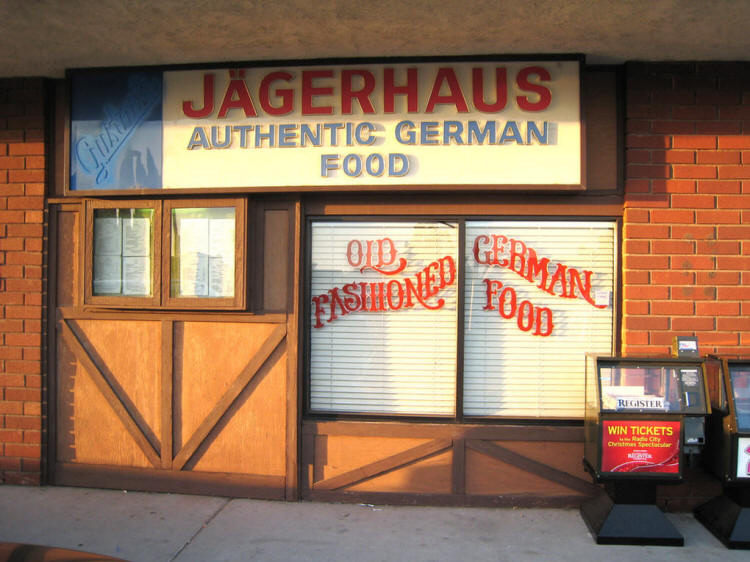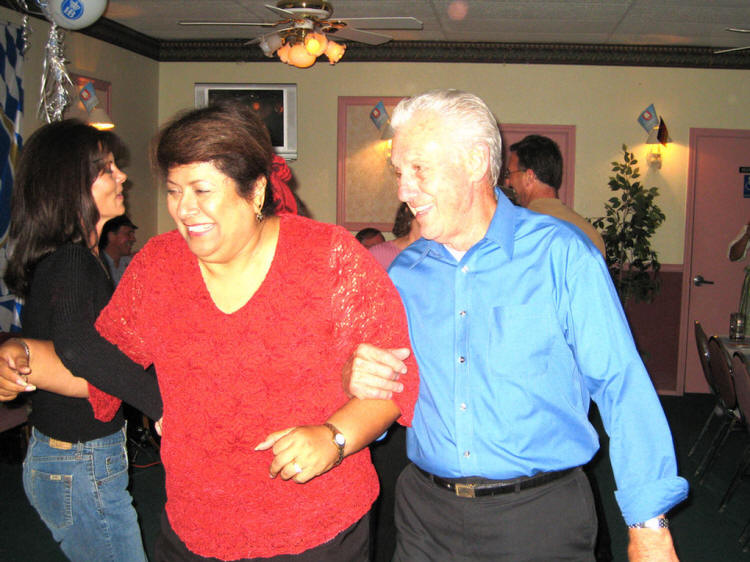Octoberfest
We All Become German For A Month
Octoberfest At Jaugerhaus
Jägerhaus German Restaurant owners Sandra Schwaiger and master chef Anton Schwaiger invite you to experience authentic German cuisine expertly prepared and served by our warm, friendly staff. A true restaurant treasure of Orange County! Vicky, Del, Paul, Sue, and Jeanette joined them for an evening of food and fun!
Let The Dancing Begin!
About The Chicken Dance - The name of the
original Swiss song was Der Vogerltanz (The Bird Dance). Since 1963
Werner Thomas had played it in restaurants and hotels. During one of
Thomas' performances, Belgian producer Louis van Rijmenant heard the
song. Van Rijmenant had some lyrics created and in 1970 released it to
the public, without much success. In 1977, Dutch local band "De
Electronica" released an instrumental version, which became a hit, and
started the international success of the song. On some recorded releases
of the music Werner Thomas is listed as the composer, while on others
other authors are listed, e.g., as "Thomas/Rendall/Hose", probably
including the authors of the particular arrangement. Since then the song
has become known under numerous other "birdie" names, including "Vogerltanz"
(Bird Dance), "Danse des Canards", "Chicken Dance" and "Dance Little
Bird". Over 140 versions of it are recorded worldwide, including Walt
Disney Records, together making over 40,000,000 records.
In 1982 it was introduced to the USA on Nationwide TV's PM Magazine
Show, (Group W Productions) by Wisconsin Orchestra leader Norm Edlebeck
as the "Chicken Dance". Despite other claims as to the name "Chicken
Dance", the name came about because an Austrian tour guide translated
"Bird Dance / Dance Little Bird" and other similar names, from German to
English by calling it "The Chicken Dance" when Norm Edlebeck's Band
appeared in Austria in the fall of 1981. Edlebeck recorded it on the
"End of The Trail" record label and used his nickname "Whoopee" as the
artist. The most popular version was recorded by the Emeralds and
released on K-Tel records in 1981. The LP "Bird Dance" sold millions of
copies in the first year. It has become a standard request at weddings
and family gatherings.
Contrary to some misconceptions, it is not an Austrian folk dance,
although it was presented as one in the Austrian film Das Fest des
Huhnes.
In the United States, the publishing rights for the song were acquired
by a New York publisher Stanley Mills.
It has become popular in the USA as a German heritage song,[citation
needed] and has been adopted by people worldwide of many cultures since
its creation. It has become a staple dance at weddings and at
Oktoberfests.
The Oktoberfest is a 16 day festival held each year in Munich,
Bavaria, Germany during late September and early October. It is one of
the most famous events in the city and the world's largest fair, with
some six million people attending every year.
The event traditionally takes place during the 16 days up to and
including the first Sunday in October. In 1990, the schedule was
modified in response to German reunification so that if the first Sunday
in October falls on the 1st or 2nd, then the festival will go on until
October 3rd (German Unity Day). Thus, the festival is now 17 days when
the 1st Sunday is October 2nd and 18 days when it is October 1st. The
festival is held on an area named the Theresienwiese (Field [or meadow]
of Therese), often called "d’ Wiesn" for short. Beer plays a central
role in the fair, with every festival beginning with a keg of beer
tapped by the Mayor of Munich who declares "O'zapft is!" (Bavarian:
"It’s tapped!"). A special Oktoberfest beer is brewed for the occasion,
which is slightly darker and stronger, in both taste and alcohol. It is
served in a one-liter-tankard called Maß. The first mass is served to
the Bavarian Prime Minister. Only local Munich breweries are allowed to
serve this beer in a Bierzelt, a beer tent which is large enough for
thousands.









